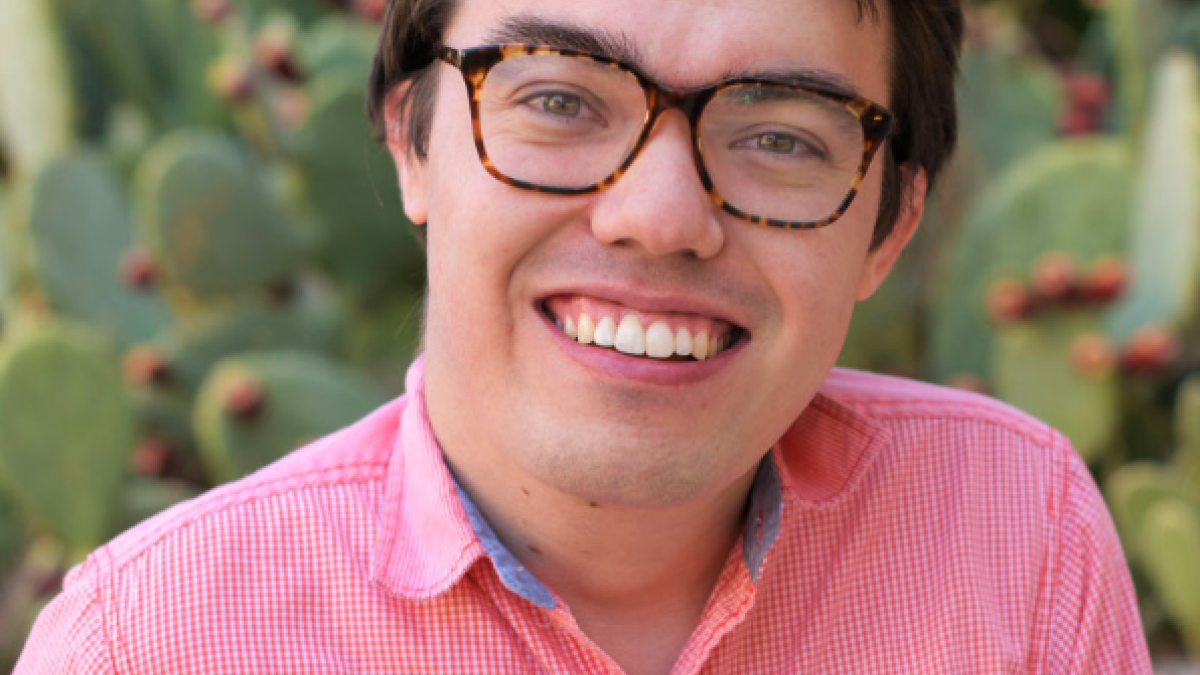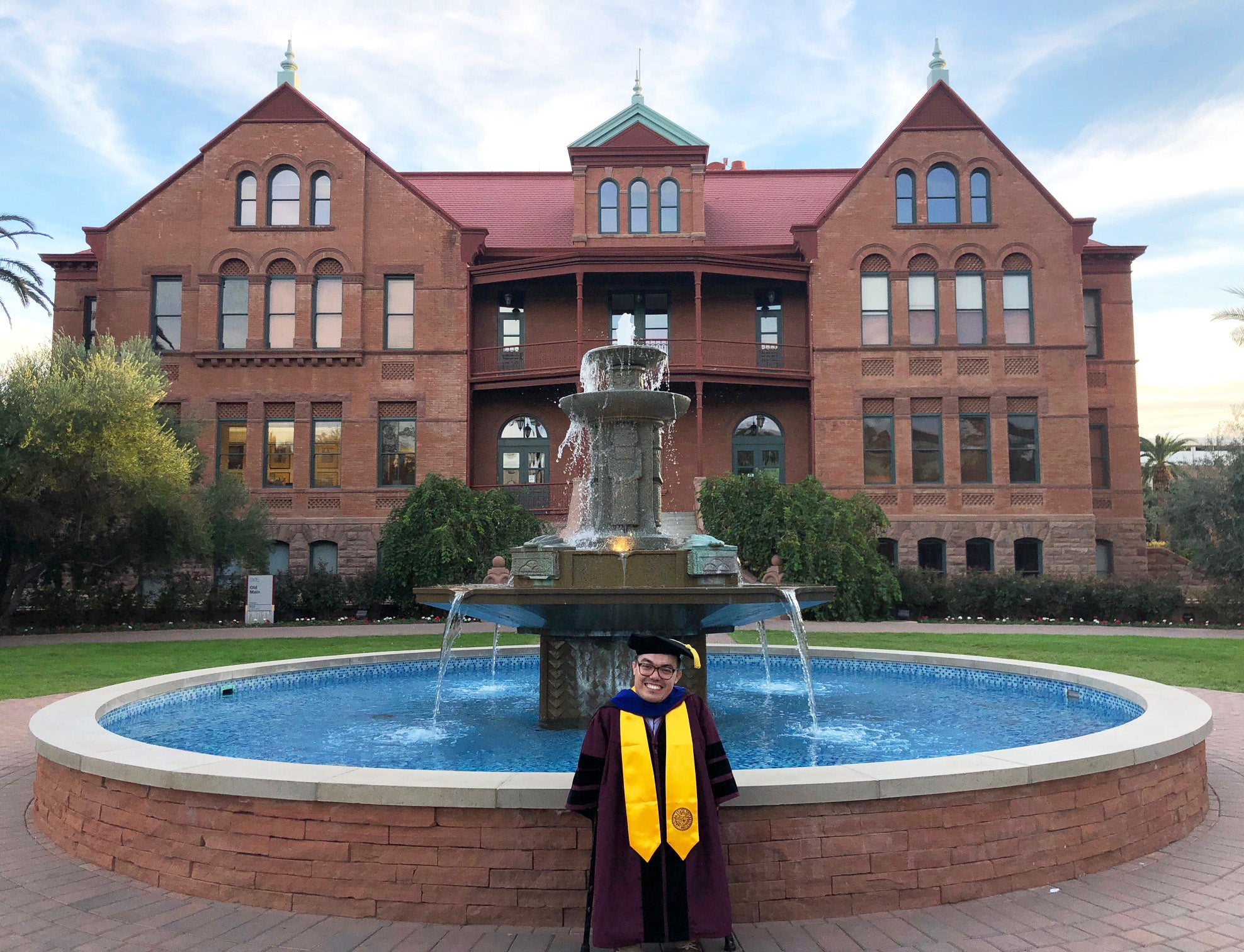Inspired by personal experiences, PhD grad advocates for inclusive science education

This fall, Logan Gin will receive his PhD in biology and society from Arizona State University.
Editor's note: This story is part of a series of profiles of notable fall 2021 graduates.
When Logan Gin was searching for PhD programs after receiving his undergraduate degrees in biology and political science from the University of North Carolina at Chapel Hill in 2017, Arizona State University immediately stood out to him.
“I was really impressed with the Center for Biology and Society and just how interdisciplinary it was and that it specifically had a place that valued and emphasized biology education research,” Gin said. “It was really at the forefront of places in the country to be able to conduct graduate-level research in biology education.”
Gin, a first-generation college student, was also inspired by the work being done at the School of Life Sciences around diversity, equity and inclusion in biology by Professor Sara Brownell’s research group. This kind of work is especially close to home for Gin, as he has diastrophic dwarfism, a physical disability that affects cartilage and bone development.
“That's something that I've had to overcome and it's certainly a part of me, but in many ways it's inspired the work that I have done and the work I want to do in the future in terms of making science learning environments more inclusive for individuals with disabilities,” he said. “Based on some of my own personal experiences as an undergraduate student who struggled with navigating these spaces, they are oftentimes inaccessible for people with physical disabilities, but really any type of disability.”
Throughout his time at ASU, Gin has worked closely with Brownell and Assistant Professor Katelyn Cooper to complete research on how science communities can create more inclusive environments for students with disabilities, coauthoring a number of research articles on the topic.
His research culminated in a dissertation that examined the challenges students with disabilities encounter in evolving higher education learning environments. By presenting his findings from a number of studies, Gin argued that institutions need to consider modifying student accommodations to better support students with disabilities.
This fall, Gin will receive his PhD in biology and society. He shared more about his research, his experiences at ASU and what’s next for him.
Question: What’s something you learned while at The College — in the classroom or otherwise — that surprised you or changed your perspective?
Answer: How important it is to emphasize diversity and inclusion. I've heard the buzzwords of diversity, equity and inclusion prior to coming to ASU, but truly understanding its importance and prioritizing it above anything else has really kind of changed my perspective on how I would approach situations from here on out. It’s crucial to make sure that diversity, equity and inclusion are truly at the forefront in both our research, our teaching and our service.
The Research for Inclusive STEM Education Center inspired a lot of the work that I've been able to do in my PhD. For example, the center put forth an entire series on striving for racial justice in academic biology that was essentially a nationwide event to respond to issues of racial injustice in the country. Folks in our community and in our discipline really look to the center, our research group, and Sara Brownell and Katey Cooper in particular, in terms of what it looks like to conduct research in diversity, equity and inclusion. Just being a part of that has really kind of changed my mindset on how to approach these issues.
Q: Did you experience any obstacles along your way? How did you overcome them?
A: I'm short statured and I use crutches and a mobility scooter to get around campus and otherwise. So that's inherently led to challenges, both physically as I navigate spaces and just as I approach my work. … I've personally struggled in some of my lab courses, for example, with accessing lab benches and doing some of these things that just based on the design of our spaces make it challenging. That's an obstacle that has carried with me from undergraduate to graduate school, but thankfully with the help of mentors like Sara and Katey we've been able to mitigate some of those challenges that I may face.
One other thing that I’ve had to overcome in graduate school is struggling with mental health, specifically anxiety and depression. That inspired another line of my work that specifically focuses on students with mental health conditions as they navigate both undergraduate and graduate school. Knowing that this is a part of me and that it may impact me at different instances, but it doesn't necessarily mean that I can't complete and be successful in a graduate program, has really been impactful on my journey. Thankfully having supportive mentors, peers and colleagues has really helped with that.

Logan Gin poses in front of Old Main on the Tempe campus after defending his thesis. Photo Courtesy Sara Brownell/Logan Gin.
Q: Were there any clubs, organizations or opportunities that positively impacted your ASU experience?
A: I've had the opportunity to serve as an intern at the Teaching Innovation Center and that's been a really wonderful experience to see how we can get this kind of research into practice and how we can actually impact the students who are in our courses with evidence-based research that we're doing and our research team. It’s really been a great opportunity to work with practitioners and instructors who are looking to make their courses more inclusive and think about inclusive course design.
Q: What’s the best piece of advice you’d give to those still in school?
A: Do your best to network and get to know other people, both peers and colleagues, but most importantly professors or instructors. Find those folks who can serve as resources for you, can be advocates for you, can be mentors for you. I would encourage students to get to know folks like that who are here to serve you and be allies for you as you navigate uncertain situations. I've had the privilege of having phenomenal mentors and advocates who have helped me respond to a number of different challenges and situations that I've had both as an undergraduate and a graduate. Now I consider them lifelong mentors and coaches as I navigate next steps in my journey and my career.
I would also say, take advantage of what a research intensive public university like ASU has to offer. Just the amount of resources that the university has is incredible. I often reflect on my own undergraduate experience and attending a large public research university and not realizing until maybe my third and or fourth year of college the amount of incredible research that's going on. … If you’re able to, I would certainly recommend fully immersing yourself in the university community because it is such a special place that can truly change your perspective or your trajectory.
Q: What are your plans after graduation?
A: I would really love to interface with faculty in terms of thinking about inclusive course design for science courses and then with students in terms of thinking about how we can better accommodate their experiences and in these spaces. I think my ideal role would merge what we know from the disability studies side of things and the evidence-based teaching side of things to really promote a positive and equitable experience for individuals with disabilities. I'm most broadly interested in finding ways in which we can create more diverse and inclusive science learning spaces for students. So things like active learning courses, online courses, lab courses, undergraduate research experiences. As our educational learning environments change, I want to be a proponent and advocate for diversity and inclusion in these spaces.
More Science and technology

Hack like you 'meme' it
What do pepperoni pizza, cat memes and an online dojo have in common?It turns out, these are all essential elements of a great…

ASU professor breeds new tomato variety, the 'Desert Dew'
In an era defined by climate volatility and resource scarcity, researchers are developing crops that can survive — and thrive —…

Science meets play: ASU researcher makes developmental science hands-on for families
On a Friday morning at the Edna Vihel Arts Center in Tempe, toddlers dip paint brushes into bright colors, decorating paper…

